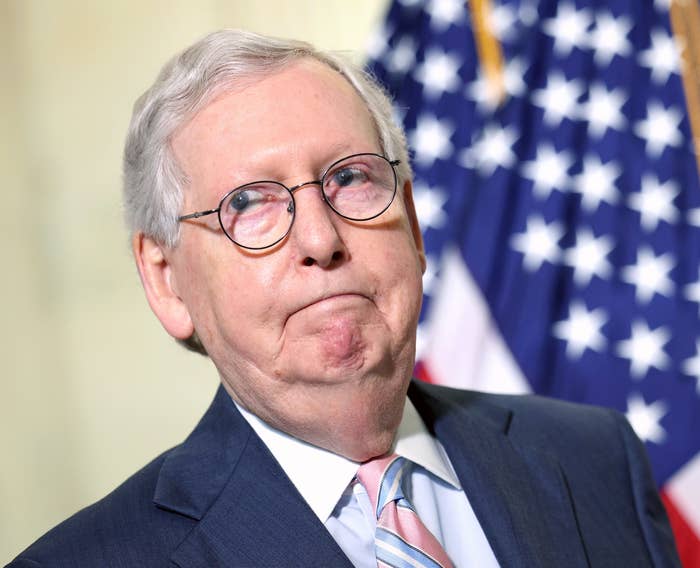
WASHINGTON — Senate Republicans have blocked the creation of an independent bipartisan commission on the Jan. 6 attack on Capitol Hill. The commission would have investigated the attack, which contributed to the deaths of five people, but it risked unwelcome attention on former president Donald Trump’s responsibility.
The Senate voted 54–35 Friday in favor of advancing a bill to launch an inquiry modeled on the 9/11 Commission. But despite majority support, the bill came just short of the 60 votes needed to overcome the Senate filibuster. The bill now dies on the Senate floor, the first Democratic priority to be formally filibustered in the Biden era.
Republican Sens. Mitt Romney, Susan Collins, Bill Cassidy, Ben Sasse, Lisa Murkowski, and Rob Portman split from their party to vote in favor of advancing the bill. Eleven senators, including two Democrats, did not vote, ahead of a scheduled weeklong Senate break.
Senate Majority Leader Chuck Schumer accused Republicans of obfuscating for political reasons — fearing that a high-profile study of Trump supporters storming the Capitol could hurt their chances in next year’s midterm elections. Trump still has tremendous influence over the Republican Party and, even out of office, threatens to turn the party’s voters against candidates he views as insufficiently loyal.
“Shame on the Republican Party for trying to sweep the horrors of that day under the rug because they’re afraid of Donald Trump,” Schumer said on the floor after the vote.
Some congressional Republicans have radically downplayed the Jan. 6 attack as time has gone by, with Rep. Andrew Clyde recently saying it looked like a “normal tourist visit.”
Late Thursday night, Murkowski lamented her party’s decision to stand in the way of the commission.
“We just can’t pretend that nothing bad happened, or that people just got too excitable,” she told reporters at the Capitol. “Something bad happened. And it’s important to lay that out.”
“To be making a decision for the short-term political gain at the expense of understanding and acknowledging what was in front of us on January 6, I think we need to look at that critically,” she added later. “Is that really what this is about? Is everything just one election cycle after another?”
Republicans offered various reasons for their opposition, from the timing to the makeup of the body itself. Though the commission would be bipartisan — with five Democrat-appointed and five Republican-appointed members, and both the Democratic chair and Republican co-chair required to sign off on subpoenas — Senate Minority Leader Mitch McConnell brushed it off as a political exercise.
“I think at the heart of this recommendation by the Democrats is that they would like to continue to debate things that occurred in the past. They’d like to continue to litigate the former president into the future,” he said.
Republicans also argued that congressional committees and law enforcement are already investigating the Jan. 6 riots.
“People are going to jail that broke into the Capitol. That’s a good thing. We had a whole impeachment trial,” said Sen. Lindsey Graham.
Gladys Sicknick — mother of Brian Sicknick, the Capitol Police officer who was attacked by the mob and died after suffering two strokes the next day — had asked for meetings with Republican senators to urge them to vote for creating a Jan. 6 commission.
“This is why I’m here today. Usually I’m staying in the background, and I just couldn’t stay quiet anymore,” she told WUSA.
Some Capitol Police officers also sent out a letter begging Congress to investigate the attacks. Sandra Garza, Brian Sicknick’s former partner in the Capitol Police, joined his mother lobbying senators Thursday. “I really want the senators to do the right thing and vote on this commission. It is so, so important. We really need to get to the bottom of what happened that day so that this never happens again,” she said after meeting with Collins.
Murkowski on Thursday night told reporters she had met with Sandra Garza and Gladys Sicknick. “I am heartsick that you feel that you need to come and advocate to members of Congress that we stand up and say, ‘The truth is hard, but the truth is necessary,’” she said she told them.
The awkward politics for Republicans were obvious. The Capitol was overrun on Jan. 6 by a crowd of Trump supporters responding to the former president’s lies about the election being stolen. The timing coincided with Congress counting the electoral college votes that declared Joe Biden the winner of the election. Trump’s open and repeated instigation would presumably be a key part of any investigation. Trump still insists the election was stolen from him, something congressional Republican leaders would prefer to sidestep entirely.
House Republican leaders also opposed the commission but were less successful in rallying their members. The bill passed the House earlier this month in a vote of 252–175, with 35 Republicans voting for it and 175 against.
The structure of the investigation was negotiated by House Homeland Security Committee chair Rep. Bennie Thompson and ranking Republican Rep. John Katko. It would have been made up of 10 “prominent United States citizens,” with Democrats and Republicans each appointing half the members, and tasked with finishing a report on the causes of the Jan. 6 attacks by the end of the year.
Some Republicans pushed internally for the inquiry but didn’t make much headway. “We owe it to the brave men and women who defended our lives that day, and in some cases did so at the cost of their lives,” said Collins after meeting with Gladys Sicknick.
Sen. Mitt Romney said he understood his colleagues’ concerns about the commission creating a focus on Jan. 6 that could hurt Republicans in the midterms but argued it was needed. “I think it’s important that some answers be provided so that we can prevent events like this from occurring again,” he said. “But I’m in the distinct minority in that regard.”
